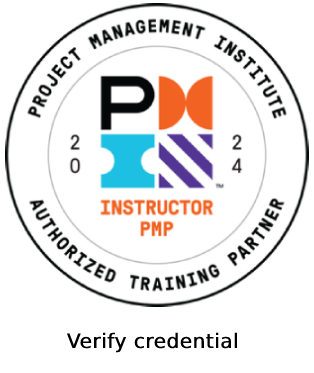Course Description
This PMP Exam Preparation course is designed for project management practitioners who want to earn the Project Management Professional (PMP®) certificate from the Project Management Institute (PMI). The course takes you through ‘Creating a High-Performing Team’, ‘Starting the Project’, ‘Doing the Work’, ‘Keeping the Team on Track’, and ‘Keeping the Business in Mind’ modules and further practical discussions and case studies to ensure participants understand all tools, techniques, models, and artifacts necessary to manage and deliver projects. Our course includes official PMI study material, practice questions, and simulated tests that prepare candidates to take the PMP exam and pass. Our instructors, who are project managers, are PMI-certified and authorized to deliver and teach the updated PMP curriculum. As an Authorized Training Partner (ATP) of the Project Management Institute, Inc. PMI®, we are proficient and well-versed about the new exam content and can provide an excellent delivery that should help participants pass the PMP exam with distinction. Our course curriculum goes above and beyond the PMBOK, and is up-to-date with the PMP new exam content outline as of early January 2021.
Besides that, you will receive more than 6000 practice exam questions based on the latest edition of the Exam Content Outline (ECO) and the updated exam.
Join a FREE 3-hour PMP Exam Certification Session to learn more about this course. Check our schedule of free events here.
Use our Project Victor Exam Simulator to practice free sample PMP Exam Questions.
Moreover, all participants who registered in this course will receive a 90-day unlimited access to practice more than 6000 PMP practice questions.
Course Downloads

After joining PMP boot camp with Dr. Petros at Project Victor, I earn much more confidence in PMP exam preparation. Not only PMP examination but also project management skillset has improved dramatically. Dr. Petros is willing to share his expert knowledge and (…)
Select and Register for PMP Exam Prep Bootcamp

Key Features of PMP Exam Prep Training
The Importance of PMP Exam Prep Boot Camp
Fast-paced work environments and competitive markets have created a critical and huge demand for project managers who can successfully deliver a project from start to finish. Awarded by the Project Management Institute (PMI)®, Project Management Professional (PMP)® is a globally-recognized credential that has been valued by industries and renowned companies all over the world for over 30 years.
Advantage of PMP Certification
Certifies your talent:
The PMP Certificate is proof that a project manager has the experience and skills to deliver a project successfully.
Improves your earning prospects:
Professionals with PMP credentials usually see better salary hikes than their non-certified counterparts.
Opens doors
A PMP credential can get you access to globally renowned companies of your choice.
Applies everywhere:
Since PMP certification isn’t based on a specific methodology, the concepts and techniques can be adapted to any real-world challenge in project management, across industries, market segments and geographies.
Encourages learning:
In order to maintain your PMP credential, you will have to keep yourself abreast of best practices in the domain of project management. PMI also keeps its credential relevant by continually updating its programs.
Eligibility Criteria for PMP Certification Exam
The PMP certificate is ideal for project managers across industries, who are looking for steady growth in their careers. The certification training course will impart valuable knowledge and skills in project management that will set you apart from your colleagues and improve your earning prospects. As per PMI, the eligibility criteria to apply for the PMP are as follows:
Secondary degree (high school diploma, associate’s degree, or the global equivalent)
- Five years of project management experience leading and directing projects
- 35 hours of project management education
A four-year degree (bachelor’s degree or the global equivalent)
- + At least three years of project management experience leading and directing projects
- + 35 hours of project management education
Did You Know?
- 80% of high-performing projects use a credentialed project manager
- 77% of high-performing organizations have ongoing project manager training in place
- High-performing organizations with project management guidance lose 12 times less money than low performers (US$20 million versus US$230 million for every US$1 billion spent on projects).
(Sources: pmi.org, PMI®’s ‘Pulse of the Profession: The High Cost of Low Performance 2014’)
Detailed Course Syllabus
PMP Exam Sneak Peek
฿4,000.00
CAPM Exam Prep Bootcamp
฿40,000.00
Introduction to PMBOK V7
฿4,000.00
PMP Exam Prep Practice Questions
฿4,000.00
- President of PMI Thailand Chapter for 13 years (2011-2023).

- Currently Past President and PMI Thailand Chapter Counselor.
- He is a PMI licensed training instructor – profile on PMI global website.
- He is a Certified Program Management Professional (PgMP®) (Project Management Institute – www.pmi.org); Certificate # 2079271.
- He is a Certified Project Management Professional (PMP/CAPM®) (Project Management Institute – www.pmi.org); Certificate #1258917
- He is an Agile Certified Practitioner (PMI-ACP®) (Project Management Institute – www.pmi.org); Certificate #2600926
- He is a Certified Scrum Master (CSM®) (Scrum Alliance – www.scrumalliance.org); Certificant ID: 001062861
- He is a SAFe Program Consultant (SPC)® 6.0; Certificate ID: 50804412-3031
- He is a SAFe Agilist® 6.0 (www.scaledagile.com); Certificate ID: 23353981-8934
- He is Certified Risk Management Professional (RMP®) (Project Management Institute – www.pmi.org); Certificate #2033120
- He has experience managing and leading mega-projects (Information Technology, Airport-related, CCTV-related, Transport-related, and Power Infrastructure) in various industries.
- He is a commercial contract manager, reviewer, and advisor.
- He teaches part-time at King Mongkut University of Technology (Thonburi) – Graduate School of Management and Innovation (Master Degree in Project Management). He is an invited lecturer to Chulalongkorn University.
- He holds a Doctorate degree obtained from Assumption University of Thailand with an international record of publications in refereed journals with a special concentration on business management.
- He has trained more than 5000 program/project managers, project engineers, project coordinators, and project team members since 2010.
- He has helped certify more than 800 Project Management Professionals (PMP/CAPM/PMI-ACP) in Thailand.
- He is also a highly experienced speaker and trainer who is also passionate about Project Management.
- Passionate about the Agile methodologies and their applications in different business environments
- Project Victor’s Designed PMP Exam Course Material (Hard Copy)
- PMI licensed training material (Digital Copy)
- Access to Project Victor PMP Exam Simulator which includes access to more than 6000 realistic PMP exam sample questions (including new Agile questions).
- Project Victor’s Multi-colored Process Chart.
- Project Victor PMP Certificate of Completion (officially certified by a PMI Authorized Training Partner), which will be useful in case of a PMI Application Audit.
- PMP Examination notes highlighting the important topics and details to remember and review prior to the exam.
- PMI® Contact Hours: Each Contact Hour is 1 PDU (Total of 40 Contact Hours/PDUs for full course) – delivered by PMI Authorized Training Partner.
- One-to-One coaching to prepare the PMP Exam Application prior to submission to PMI.
- 5-Days at a reputable hotel that includes 2 coffee breaks and International Buffet lunch.
Course Duration
- Five Days (equivalent to 40 Contact Hours or Professional Development Units – PDUs)
Delivery Method
- The instructor will lead this course by providing practical examples and case studies from his experience managing and delivering projects in Thailand.
Course Objectives
This course takes you through the new structure of the PMP Exam that includes topics ranging from ‘Creating a High-Performing Team’, ‘Starting the Project’, ‘Doing the Work’, ‘Keeping the Team on Track’, and ‘Keeping the Business in Mind’ modules and further practical discussions and case studies to ensure participants understand all tools, techniques, models, and artifacts necessary to manage and deliver projects.
- Understand the roles and responsibilities of a project manager in different environments that apply various methodologies in managing and delivering project (predictive, iterative, and adaptive).
- Understand how projects operate in any environment and how the environment influences the role of the project manager and the team in its delivery.
- Differentiate between various project lifecycles and tailor the application of the necessary tools, techniques and models to their own organization.
- Understand how a project manager engages the team in developing a detailed project management plan with its various components (e.g., scope, schedule and cost baselines).
- Understand how to plan projects in Adaptive environment (e.g., Release Planning, Iteration Planning, and Product Roadmaps).
- Understand how to collect and analyze requirements, develop and decompose deliverables by creating Work Breakdown structures, and defining scope baselines.
- Understand how Agile teams create the product backlog and use it as an artifact to prioritize work in order of size and value.
- Develop a detailed project schedule by applying various schedule methods including the critical path method, critical chain method, pull-based scheduling, and using Kanban boards to manage flow.
- Apply estimation tools and techniques to develop project budgets and define cost baseline and project funding requirements.
- Define quality standards, metrics, tools, and techniques to build quality into the product, analyze processes for improvement, and use tools to inspect and correct defects.
- Plan the necessary resources required to develop the project deliverables.
- Learn and apply various tools and techniques used to develop the team skills and use various conflict resolution techniques to manage issues and problems among the team.
- Apply interpersonal skills and leadership skills to create a safe environment for the team to deliver projects.
- Plan and manage risks after apply the risk management process and engaging the team to adopt risk management practices in project delivery.
- Understand the detailed procurement management process and how a project manager engages with the procurement manager to acquire the necessary resources and solutions from external 3rd party vendors.
- Apply communication management and stakeholder engagement skills to manage the needs and the expectations of the different stakeholders on the project.
- Discuss the importance of PMI’s code of ethics and understand the expectations necessary for a project manager to operate in any environment with emphasis on honesty, fairness, responsibility, and respect.
- Project Managers
- Project Leaders
- Project Team Members
- Managers (Directors, General Managers)
- Professionals interested in applying for the PMP Exam
Course Outline
The new PMP Exam Curriculum is divided into five modules:
Module 1: Creating a High-Performing Team
In Module 1 we look at how to work with and engage others in a project environment by building a fantastic team to deliver the work.
Module 2: Starting the Project
During Module 2 we discuss the tricky aspects of starting a project effectively. You’ll learn everything you need to know about how to plan the work for the best possible kick off.
Module 3: Doing the Work
In Module 3 we move into talking about how to get the work done efficiently, effectively and with input from all relevant stakeholders.
Module 4: Keeping the Team on Track
The work has started and the team is busy. But are they working on the right things? In Module 4 you’ll learn how to keep the team focused and on track. This is a really important discussion for project managers.
Module 5: Keeping the Business in Mind
Projects are initiated to deliver something useful to the business, so it’s important that you stay aware of the business context for the project. That context frames your project decisions every day.
This course covers a lot of subjects and we will be discussing intricate details of every module and providing practical examples and discussion to ensure solid understanding.
Please also note the modules are not the same as course training days. Modules may be split over several days depending on the breadth of the content.
Detailed Course Content
- Building a Team
- Defining team ground rules
- Negotiating project agreements
- Empowering team members and stakeholders
- Training team members and stakeholders
- Engaging and supporting virtual teams
- Building shared understanding about a project
- Determining the best project methodology, methods and practices for the work
- Planning and managing scope
- Planning and managing budget and resources
- Planning and managing your schedule
- Planning and managing quality
- Planning and managing procurement
- Integrating project planning activities
- Establishing a project governance structure
- Planning and managing project phase closure
- How to assess and manage risks
- How to focus on delivering business value
- Managing communications
- Working with stakeholders
- Creating project artifacts
- How to manage project changes
- How to manage project issues
- How to ensure knowledge transfer for project continuity
- Leading a team
- Supporting team performance
- Addressing and removing impediments, obstacles, and blockers
- Managing conflict
- Collaborating with stakeholders
- Mentoring stakeholders
- Using emotional intelligence to promote team performance
- Managing compliance requirements
- Evaluating and delivering project benefits and value
- Evaluating and addressing internal and external business environment changes
- Supporting organizational change
- Employing continuous process improvement
We’ve Trained Professionals
across Global Companies













































Need more information on Trainings?
We’re a click away
Free Shipping
Free Shipping for orders over £130
Money Guarantee
Within 40 days for an exchange.
Flexible Payment
Pay with Multiple Credit Cards
Online Support
24 hours a day, 7 days a week
Don't compromise on quality!
Subscribe to the newsletter
- TEL : 0980 444 45 456
- MAIL : hello@demo.com
Don't compromise on quality!
- TEL : 0980 444 45 456
- MAIL : hello@demo.com
About Wooma
Help
Categories
Campaigns
Company
Resources
Contact Details
-
200/05, Narathiwat Ratchanakarin Road,
Chongnonsi Yannawa, Bangkok 10120 - info@projectvictor.com
- (66) 92 348 4772
- (66) 02 294 2492
Copyright © 2025. Project Victor Co., Ltd. All Rights Reserved.
- Call us on (66) 92 348 4772
“PMI,” “PMP,” “CAPM,” “PMI-ACP,” “PMBOK,” and the PMI Authorized Training Partner logo are registered marks of the Project Management Institute, Inc.
“ITIL®,” “PRINCE2®,” “MSP®,” and “P3O®” are registered trademarks of AXELOS Limited, used under permission of AXELOS Limited. View Disclaimer






